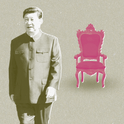This will be a year of transition. The United States is struggling to show that its model of capitalism can still generate wealth, and that the world’s most powerful military machine can still win wars. The question is, will it recover, or will it surrender significant influence to China and the new champions of the emerging world? The outcome will also lay the ground for the following year, the “triple witching hour” of 2012, when the leadership of three of the world’s most important countries may change. President Barack Obama will battle for re-election, Xi Jinping is likely to assume the premiership of China and Vladimir Putin, Russia’s prime minister, is expected to decide that he would like a further stint as president. There are reasons for optimism: on economic growth, on the reduction of poverty in some of the poorest countries, on fighting terrorism, and on new technologies to cope with climate change and transform development. Astonishingly, the 2010 UN Millennium Development Goals Report found that there would be 3.8bn mobile subscriptions in the developing world by the end of the year: 73 per cent of the global total.
This is a different world from that of 10th September 2001. It is not just that China is now part of every calculation. The US and European countries, which define themselves by liberal, democratic values, are the ones with the huge debts, and the countries upon which they are trying to impress these values are financially stronger. Put bluntly, the US can’t afford to pay China to sign up to its view of the world any more—as the failed Copenhagen climate change summit in 2009 showed. The next decade—even the next year—will feel much less western. ON THE RISE China China is the undisputed winner of the past few years, but strains are visible. In March, Premier Wen Jiabao will ask the National People’s Congress to back the next five-year plan, which, he says, will focus more on investment than on short-term growth. All credit to Beijing for keeping the economy growing at 10 per cent, but inflation is a concern. China is now feeling the hard edge of the debate about whether it can get richer but not more liberal; leaders fear that if they let the currency rise, as the US demands, that will give consumers so much power it would amount to revolution. Abroad, China is hoping it can keep buying energy and mineral resources while sidestepping the US’s demand that it play a big part in world diplomacy. It is outflanking the US and Japan, buying up, say, the “rare earth” minerals neodymium and dysprosium (ingredients of the Toyota Prius). An important WikiLeaks revelation was that the US got China to back new sanctions against Iran only by getting Saudi Arabia to guarantee China’s oil supply. But one benefit of China’s spree is that its cash—and workers—are helping develop eastern and central Africa in a way that 60 years of development economics has failed solidly to do. It would be wrong to attribute this to anything other than self-interest, nor is the effect always to the host country’s good. But it is a big injection of infrastructure. China is helping rebuild Iraq and Afghanistan too, in return for access to oil and Afghanistan’s best copper mine. Africa Optimism in at least parts of this vast con-tinent has ticked upwards. Dominique Strauss-Kahn, managing director of the IMF, recently pronounced the outlook good despite the financial turmoil of the past few years, a rare expression of confidence. The UN records “major advances in getting children into school in many of the poorest countries,” and better control of malaria, HIV, and measles. In sub-Saharan Africa this has helped cut child deaths by 22 per cent, from 184 to 144 per 1,000 live births, between 1990 and 2008. Britain It has lost its reputation within Europe for superior economic management; its army is shrinking; David Cameron is struggling to say that Britain is still a “thought leader” on the world stage. But his claim looks better by the month. The wisdom of staying out of the euro, and willingness to send soldiers abroad, still give Britain clout. George Osborne, the chancellor, looks increasingly likely to be right in his calculation that cuts will not produce a new recession. But the cuts have yet to bite hard, and more people will lose their jobs. Given that, the coalition still looks resilient, though support will be tested by a bumper batch of elections in May: for 279 local authorities in England, the Northern Ireland assembly and councils, the Welsh national assembly, the Scottish parliament and, possibly, a referendum on the voting system. Another bright spot: Britain, with the US, has had success in countering terrorism. Intelligence officials claim that al-Qaeda in Afghanistan and Pakistan is greatly weakened. Many jihadists decamped for Yemen, now the prime source of threats, say experts. Security services believe they’re better at detecting organised plots, and are now perhaps more worried by the threat of a lone person picking up a gun than by an orchestrated attack. The tool they’d most like is the ability to deport people, a debate which will flare up again soon with the government’s review of counter-terrorism laws. Iran It’s hard not to say that Iran’s influence is rising. Tehran is pressing ahead with its nuclear work despite sustained American, European and Arab efforts to stop it. The US is reluctant to attack Iran’s nuclear sites, and has been dissuading Israel from doing so too. The US has almost given up trying to stop Iran’s nuclear work entirely, focusing instead on how to persuade it not to build a weapon. That said, new EU sanctions on Iran are having real impact as Germany and Italy, the Islamic Republic’s biggest European trading partners, have joined in. Those whose job it is to watch Iran’s nuclear sites (a large tribe) tend to say that it will still take Iran some years to get to the brink of having a weapon. ON THE ROPES The US, and Obama They’re in trouble. Sure, the president has succeeded in one goal: changing America’s image abroad. During the Iraq war, an Iranian diplomat in London quipped: “I love America, such a wonderful country—such a shame to see it taken over by religious fundamentalists.” It’s hard to make that joke any more. But economic figures are mixed, at best; and neither party has the answer to the pensions and healthcare crisis looming just a generation away. The risk of bank failures is significant, because more people will lose their jobs and more homes will be repossessed. There are now 310m Americans; there will be 420m by 2050—that’s bound to make the US absorbed in its own problems. Mexico is one of those, with drugs wars leading to a spike of murders and kidnappings in Arizona (and local police complaining that Washington is too preoccupied with Afghanistan to notice). It’s wrong to write off Obama’s re-election in 2012, but he’s no shoo-in. Europe Even Paul Krugman, the economist who once described the unravelling of the euro as unthinkable, has now said “the unthinkable has become thinkable.” The rescue of Greece and Ireland has only deferred the problem, as Greece, for one, almost certainly cannot meet payments on its debts. It’s hard to be optimistic about Spain or Portugal. At some point, the markets expect, lenders to troubled countries will be told they won’t get all their money back. It seems likely that the eurozone will shed members: either the weakest, or the strongest, Germany, fed up with footing the bill. How big a threat does this pose to the world economy? “Medium-sized,” says one senior London banker; it depends on how much banks are vulnerable. The euro crisis could threaten the EU’s future, too. The bailout fund is nearly five times the EU’s annual budget, a far bigger sum than countries are used to paying for the European dream. Migration within the EU will be a big theme, too, as people move to find jobs; David Cameron has already declared “the Irish are coming” (see p55). A third of EU countries are facing severe austerity, and citizens now have unprecedented freedom to move to other member states. Dangerous flashpoints These include North Korea, Iran and central Asia, especially Kyrgyzstan, with the Fergana valley a crossroads of ethnic and religious conflict. Argentina, which no longer allows outside scrutiny of its financial figures, is vulnerable to any plunge in commodity prices. ON THE AGENDARetreat is the new war Defence cuts will be one of the noisiest themes in the US and Europe, even though Nato’s rows about how to get out of Afghanistan will keep military activity on television screens. Obama, committed to begin a US exit in 2011, will clash again, more publicly, with General Petraeus, who wants no firm date; the compromise will be to redefine forces left there as “advisers.” Cyberwar Everyone’s talking about it. General Sir David Richards, chief of the defence staff, says this is the shape of war to come—and that we are not prepared. So do former heads of Nato. Parts of the Israeli press claim the Stuxnet “cyber worm,” said to have attacked Iran’s missile systems, is still burrowing away. Yet the claims are uncheck- able. The threat, while impossible to dismiss, may be just a useful distraction from the painful cuts to existing forces. Population growth How to slow population growth is back as a theme, if muted, after decades of being taboo. Climate change is the incentive, but success has made the subject less toxic. Populations are growing less quickly, outside the Middle East. There are few problems to which Iran is the solution—but on voluntary birth control, it is now the world’s greatest success story; soon after the 1979 revolution the ayatollahs worked out that a soaring population meant trouble, and promoted contraception. Green technology—but no deals Good news is the speed with which China is investing in clean energy. But a big international climate change deal is off the cards, probably forever. The Doha trade talks are all but dead, too—and most ambitious multi-sided deals have probably had their day, replaced by one-to-one agreements, or by coalitions of the willing. CONCLUSION This will feel like a rough year if you are in the US, Europe or Japan, as growth remains fitful, jobs are precarious and other countries less interested in liberal democracy challenge the old order. But growth is confounding predictions in China, India, Indonesia, Brazil and much of Latin America. A recent UN report notes, “the overall poverty rate is still expected to fall to 15 per cent by 2015, which translates to around 920m people living under the international poverty line—half the number in 1990.” The world is getting richer, and much of the growth is going to the poorest. People are inventing technology to combat en-vironmental problems. Terrorism, while hardly gone, no longer dominates British, US, or EU policy. Ten years after 9/11, that is good news.












